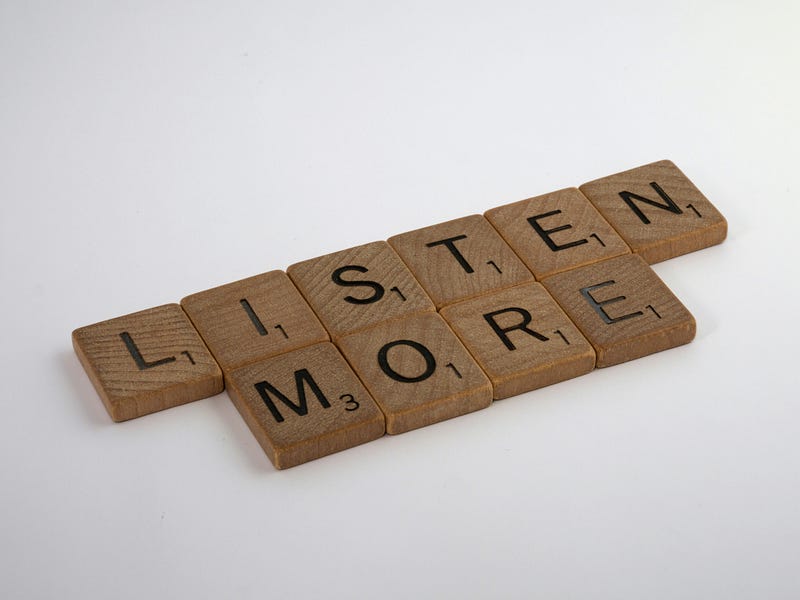# Mastering the Art of Listening: Unlocking Deeper Connections
Written on
Chapter 1: Understanding Listening
In many discussions, genuine listening is often absent. Instead, individuals typically wait for their moment to speak. Here are some strategies to cultivate exceptional listening skills.

“Most individuals do not listen with the aim to understand; they listen with the aim to respond.” — Stephen R. Covey
The Conversation Within
Most individuals don’t engage in true listening; they’re preoccupied with their own thoughts during conversations. For instance:
“I discovered a fantastic lunch spot in the city today!”
A proficient listener would respond with inquiries like, “That sounds wonderful! Where is it located?” “What types of dishes did they offer?” “What did you enjoy about your visit?”
A skilled listener allows their conversation partner to share their experiences fully. Conversely, a poor listener, who is more focused on their own narrative, might interject with:
“That’s great; I also had lunch at an amazing place last week!” As the other person elaborates on the menu, the poor listener might chime in, “Yeah, the place I visited also served chicken sandwiches; they were delicious!”
The Importance of Listening
This scenario may seem trivial, yet it underscores a crucial distinction. Many individuals fail to truly listen; instead, they filter others' stories through their own experiences and respond with their own tales or, even worse, second-hand anecdotes.
Listening is a remarkable quality. By enhancing this skill, you can instantly become a better friend, partner, parent, coworker, or even a kinder stranger. Although it can be challenging, effective listening enriches every relationship, bringing numerous benefits.
The world needs more compassionate listeners—individuals who appreciate and value you—rather than mere talkers; those who genuinely make you feel acknowledged and valued by allowing you to express your experiences.
“One of the most sincere forms of respect is truly listening to what someone else has to say.” — Bryant H. McGill
Steps to Enhance Your Listening Skills
Improving your listening abilities requires time and practice, and it may come more naturally to some than others. Here are several suggestions to help you refine your skills. I've been focusing on this for the past few years and have noticed positive changes.
- Prioritize listening when engaging in any conversation.
- Remain present. Avoid letting your mind wander, as this will reflect in your body language. I can easily tell when people lose interest in my stories, which is disheartening. I strive not to make others feel that way.
- Allow the other person to speak. Avoid monopolizing the conversation. Ask questions and encourage them to share. You can share about yourself, but keep it brief. You'll naturally sense whether the other person is interested and if there’s an opportunity to share your own story.
- Listening is an excellent way to express kindness. Offer your full attention without expecting anything in return. Just because you’re improving as a listener doesn’t mean everyone will reciprocate. Some individuals may never inquire about your experiences, and that’s perfectly fine.
- Just listen. Resist the urge to embellish every story with your views, experiences, or insights. Avoid trying to one-up others with your own examples. Simply listen.
- Avoid making the conversation a competition. Don’t be eager for your turn to speak. Intentionally allow a brief silence after someone finishes talking, fostering a sense of calm and trust, as they won’t worry about interruptions.
- Do not complete others’ sentences. This can be one of the most irritating habits, especially if you believe you know what they will say and repeatedly finish their thoughts incorrectly. Allow the other person to complete their sentences without rushing.
- If your attention drifts momentarily, apologize.
- Silence your phone and don’t allow distractions from glowing screens during conversations. Prioritize face-to-face interactions as if your phone doesn’t exist, which will make your conversation partner feel incredibly valued.
- Discover the joy of listening. It is far more fulfilling than continually discussing yourself. Learn more, create more memorable moments, and enrich your life through listening.
- Talking about yourself is like indulging in fast food: enjoyable occasionally but detrimental if overdone.
- Maintain genuine eye contact. Excessive nodding and expressions of agreement can be bothersome and may give off the impression that you’re about to interrupt.
- Commit to not interrupting. Allow individuals to finish their thoughts. They will appreciate it.
- Observe how the quality of your relationships improves and how much more you enjoy them over time.

The Value of Listening
Listening is an invaluable skill. The more you practice it, the more people will value your presence, leading to richer and deeper relationships.
You will encounter individuals who are eager for attention and cannot stop discussing themselves, which can be challenging. However, it’s rewarding that you can be there for them.
You’ll also meet people who possess superior listening skills, prompting you to share more about yourself. That’s perfectly acceptable. The key is to recognize your listening abilities and work on them gradually.
Good listeners are rare and incredibly valuable. Let’s strive to cultivate more exceptional listeners in our communities!
“We have two ears and one mouth so that we can listen twice as much as we speak.” — Epictetus
Chapter 2: Practical Listening Tips
Listening is a skill that can be developed. Here are some quick tips to get started.
The first video titled "5 Ways to Become A Better Listener (In Your Next Conversation)" offers practical techniques to enhance your listening skills and improve your interactions.
The second video, "How to Be a Better Listener in 10 Minutes," provides quick strategies for becoming a more effective listener in everyday conversations.
Join My Personal Growth Journey
Experience personal growth through the Jolanda de Koff Letter. Subscribe now, or visit my website at jolandadekoff.com, and let's explore new paths to personal and professional excellence together.